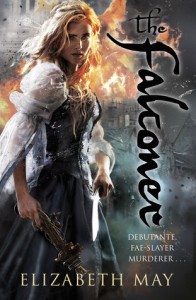 Whitley’s review of The Falconer (The Falconer #1) by Elizabeth May.
Whitley’s review of The Falconer (The Falconer #1) by Elizabeth May.
Heiress. Debutant. Murderer. A new generation of heroines has arrived.
Lady Aileana Kameron, the only daughter of the Marquess of Douglas, was destined for a life carefully planned around Edinburgh’s social events – right up until when a faery killed her mother.
Now it’s the 1844 winter season and Aileana slaughters faeries in secret, in between the endless round of parties, tea and balls. Armed with modified percussion pistols and explosives, she sheds her aristocratic facade every night to go hunting. She’s determined to track down the faery who murdered her mother, and to destroy any who prey on humans in the city’s many dark alleyways.
But the balance between high society and her private war is a delicate one, and as the fae infiltrate the ballroom and Aileana’s father returns home, she has decisions to make. How much is she willing to lose – and just how far will Aileana go for revenge?
This book had some decent action and some great writing and descriptions of fairies and magic, but it fell flat on the emotional front for me. Not because it was lacking in emotion, mind you, but more because it tried way too hard in that regard.
Falconer delivered in almost every aspect that drew me to it in the first place: evil fairies, bloody slaughter, explosions, mayhem, 19th century Scotland setting, tea parties getting attacked, and all of that part of it was excellent. I did not expect it to be a steampunk setting, which isn’t really my thing, but the steampunk aspects were minor enough that there’s a reason it wasn’t mentioned in the summary. I greatly enjoyed the variety of the fairies and their eviltude and all the descriptions of fighting them.
Everything else, however, was either iffy or downright bad. I was unhappy with the plot; despite the amount of action we got, the actual plot moved at a glacial pace. We learned about a quarter of the way in that some fairy prison is about to fail and release all the big bads into the world, and the rest of the book was just one fight after another. None of those fights served any purpose but distraction. At the end of each I thought “and are we closer to solving the prison problem now? No? You’re going to cuddle romantically over your wounds instead of addressing the world-ending problem? Sigh, if you must.” They didn’t even begin to address the prison problem until almost 80% of the way through, at which point it became clear why the author straight-up avoided it. The problem took nothing but an infodump to “solve,” because one character knew things all along.
I was also highly irritated with Aileana’s constant “I am nothing” soliloquies. This girl could not shut up for talking about how broken and empty un-person-y she was. I really don’t care if there’s an reason for it; I’m still sick of seeing women reduced right into un-person-hood in novels. You can be grief-stricken and still a person. I also didn’t get a good sense of Aileana’s actual pain, because for all she went on about how her life was ruined and such, we never really got to see her trying. So you can’t enjoy balls anymore? Well, we’re never shown you particularly trying to or wanting to try to; in fact she only goes to two of them and she spends the whole time complaining. How am I supposed to feel bad for her missing out on something she doesn’t even appear to want? The book spent thousands of words telling me how she felt and zero words showing me any actual consequences, because the book was so narrowly focused on angst and bloody battles and pretty boys.
And the ending straight-up wasn’t there. The book simply stopped mid-paragraph. That doesn’t count as a cliff-hanger; it’s more like the author got up to get a cup of coffee and never came back.
Also, there were no falcons in this book. At all. Minor point, but still, you’d think she could have at least thrown in one. Maybe it was in the ending that got left out.
Rating: 3 out of 5
This book is available from Gollancz. You can purchase it here in e-format.
